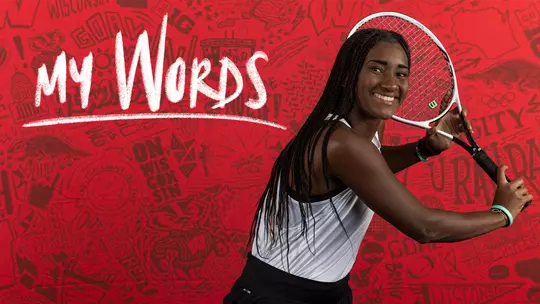
My Words: By Helping Others, I’ve Helped Myself
By Ariel Johnson, Women's Tennis
4/17/2024
WARNING: The following content contains discussion about suicide which some readers may find disturbing.
Reader discretion is advised.
The thing about tennis is that when you’re out there, you are alone.
In doubles, there is someone to share your experience with, but in a singles match, it’s just you, your opponent, and all the people watching, their expectations even louder than their cheering.
I’ve felt that pressure even before Tennis was part of my life. The burden of swimming was given to me by my mother at a young age, as it was her favorite sport back in Jamaica. But I quickly found out it wasn’t for me. I found Tennis when I was seven, I asked my mom to stop and look at a court one time when we were driving.
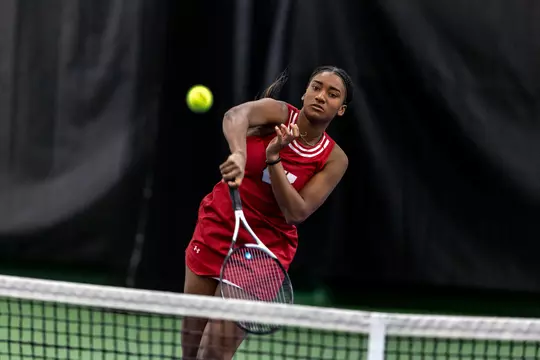
From there on, that’s what I was all about. As fun as Tennis was though, it soon turned into my method of proving myself. Even though it wasn’t what they originally planned for me, my parents, amongst many others, pushed me to hone my craft. They saw my potential and they expected the best.
And who was I to disagree? These were people who left their country as young adults, were first generation university students, and found successful careers in America. I was just their daughter, privileged enough to spend most of my time at an academy just so I could play a game. But if tennis is what made them proud, then that’s what I would do.
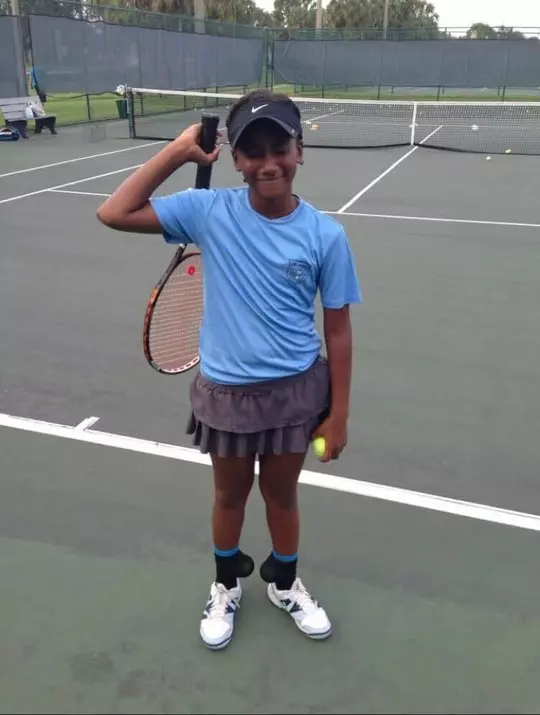
Most girls at the academy didn’t look like me, and I never felt like there was anyone that was truly helping me mold my future. Just like in a match, I was alone, playing this sport to make my parents proud, their expectations looming as they watched me.
My work paid off in the form of a potential spot on the Wisconsin women’s tennis team. Mostly everyone I played tennis with and against didn’t take the college route, they went professional as soon as they could. I began to feel like my path was being decided for me, I wanted to take my chances with something different. I didn’t know for sure if college was the right choice, but it was at least my choice. I took the opportunity with Wisconsin, to the disappointment of many around me.
Coach McKenna was great, she saw something in me that I don’t think anyone else has, and not just when it comes to tennis. She cared more about my interests and who I was as a person. The recruiting process was much more personal than what I was used to. I felt like she was committed to guiding me, and wanted to set me up to be the most successful person that I could.
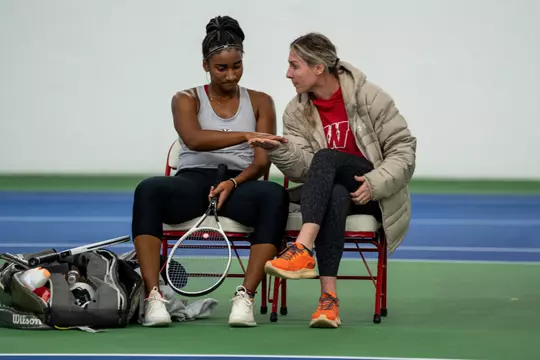
I was committed, ready to travel all the way to Madison from my home in Florida. But the later years of high school spiraled out of control. In the midst of a global pandemic, my friend took her own life.
There wasn’t a lot of purpose for me after that. I was going to Wisconsin, but why? There was no desire to play tennis, a sport which now seemed so insignificant. It’s a slippery slope, the negative thoughts pile on each other, stacking up so high that I forgot what it was like to come down to Earth. And amid it all was that lingering pressure, to “shape up” and to “get over it”. It was as if mental health was not something to be acknowledged, like my problems didn’t exist if there wasn’t anything tangible. Now I was at my new school, playing on the tennis courts, alone again.
The thing about tennis is that when you’re out there, you are alone.Ariel Johnson
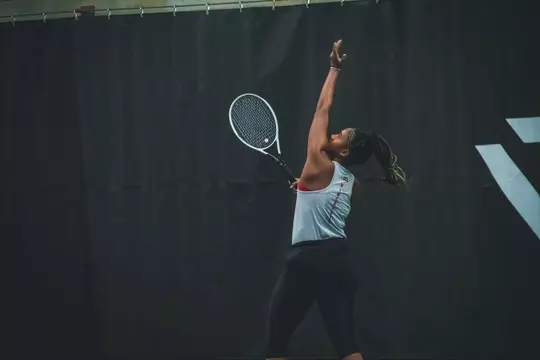
I was apprehensive about going to therapy. I had always been a big advocate for my friends to speak about their problems, but it’s a whole other thing to do it yourself. Nevertheless, with some encouragement from Coach, I sought out therapy.
As I found myself opening up more with every visit, I also found myself practicing poetry more, an outlet I first picked up after my friend died. The words I put to paper were negative and dark, it was all my repressed emotions bursting out, all my frustrations with what I had been through. But there was meaning behind the words, there was a real beauty in the way that they flowed and connected. Even though it was just me writing them, I felt heard in a way.
Poetry became a true passion of mine, honestly it was one of the first things in my life that I felt was completely mine. It gave me control in a way that tennis never had, tennis was something that could please the people in my life, poetry was for me.
There is always light. If only we're brave enough to see it. If only we're brave enough to be it.Amanda Gorman
Therapy and poetry ignited something in me, a desire to help others. Opening up and expressing myself gave me new life. I’ve always been one to try to please others, like my parents, but this was a little different. I wanted to make a real impact on people who face similar mental challenges to myself. I came to college with a law degree in mind, but I switched to psychology in order to pursue this new goal of mine.
As I discovered more about myself, I rediscovered my passion for tennis. Growing confidence brought greater enjoyment to my game. Joining the team filled me with happiness, and it also opened up opportunities like traveling to Selma, Alabama with the Big Ten Community and Impact team for UTSA’s Selma Youth Tennis Clinic last fall. Being in Selma prompted me to reflect on topics I had never deeply considered before. I felt immense gratitude towards the courageous people who championed the rights for Black people and left a profound impact on society.
And then, I had the opportunity to teach young kids who looked like me how to play tennis. I'm unsure how much they retained or if they continue to play today, but in that moment, I introduced them to a new experience and provided them with something they might not have had before. I never had someone who truly sparked a love for tennis when I was a kid, but it felt amazing knowing that’s what I could possibly be to these kids.
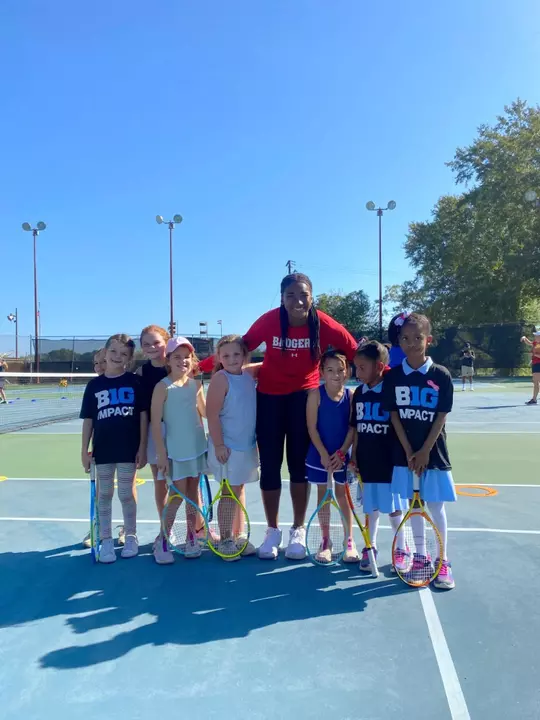
When I got home, I thought about how my passion for helping others and my love for tennis could overlap. I saw what it could do for someone else, what kind of impact it could have. This was different than playing for the appraisal of all the adults or coaches in my life. Whenever I served, I felt a sense of pride in the impact my swing could make.
Participating in the Youth Tennis Clinic in Selma inspired me to continue helping kids, which is why I’m planning to pursue a career in child therapy. My new goal now is to ensure that mental health is something that can be communicated as easily as you would a bruise or headache. I want to rid the stigma surrounding mental health. I’ve learned that helping others, in turn, helps me. Whenever I’m having a stressful day, I find that initiating an act of kindness helps me feel a little better.
This is something that’s reflected in my tennis play as well. I’m enjoying myself as much as ever. And whenever the game feels overwhelming, I recall my experience playing with the kids in Selma. Because on that day I was playing tennis, but I wasn’t alone.
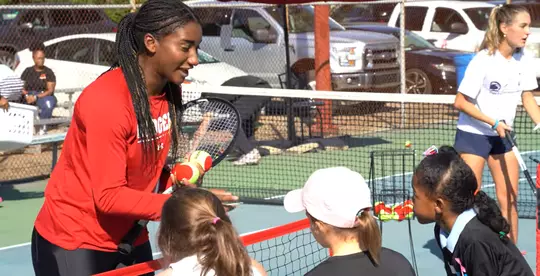
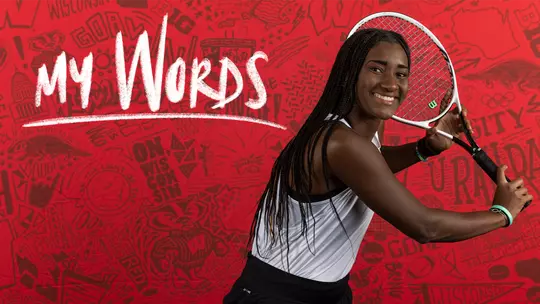
MENTAL HEALTH RESOURCES
- If you or someone you know has a mental illness, is struggling emotionally, or has concerns about their mental health, there are ways to get help. Use these resources to find help. https://www.uhs.wisc.edu/prevention/suicide-prevention/mh-resources/
- In case of a mental health crisis, call the UW-Madison campus 24-hour crisis number: 608-265-5600, option 9.
- National Suicide Lifeline: 800-273-8255
- Trevor Project Lifeline: 866-488-7386
- If you or someone you know is experiencing a life-threatening emergency, call 911 or go to the nearest Emergency Department

